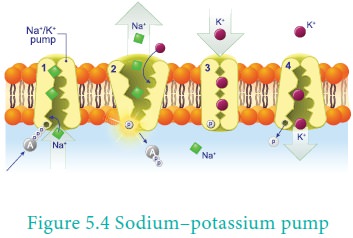Chapter: 11th Chemistry : UNIT 5 : Alkali and Alkaline Earth Metals
Biological importance of sodium and potassium
Biological
importance of sodium and potassium
Monovalent sodium and potassium ions are found in large
proportions in biological fluids. These ions perform important biological
functions such as maintenance of ion balance and nerve impulse conduction. A
typical 70 kg man contains about 90 g of sodium and 170 g of potassium compared
with only 5 g of iron and 0.06 g of copper.
Sodium ions are found primarily on the outside of cells,
being located in blood plasma and in the interstitial fluid which surrounds the
cells. These ions participate in the transmission of nerve signals, in
regulating the flow of water across cell membranes and in the transport of
sugars and amino acids into cells. Sodium and potassium, although so similar
chemically, differ quantitatively in their ability to penetrate cell membranes,
in their transport mechanisms and in their efficiency to activate enzymes.
Thus, potassium ions are the most abundant cations within cell fluids, where they
activate many enzymes, participate in the oxidation of glucose to produce ATP
and, with sodium, are responsible for the transmission of nerve signals.
Sodium–potassium pump play an important role in
transmitting nerve signals.

Related Topics